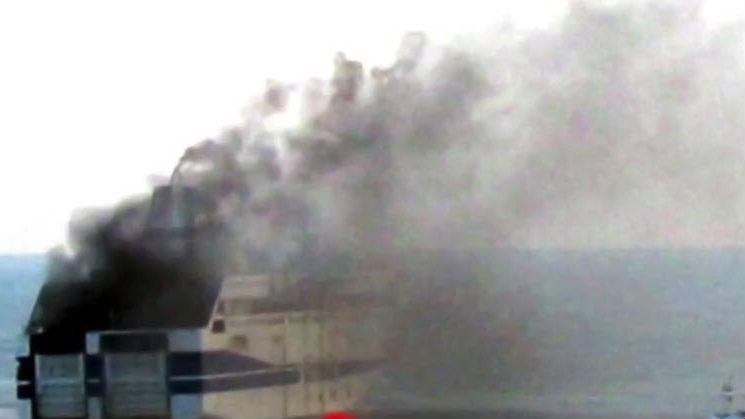MSC 96 to Focus on Passenger Safety

The IMO’s Maritime Safety Committee will meet next week for MSC 96, and a key focus area for the group will be enhancements to passenger ship safety rules.
After recent fire incidents on the ro-ro deck on ro-ro passenger ships, industry body Interferry has submitted best practice guidance on ferry safety for ro-ro passenger ships for consideration at MSC 96. The document calls for seven key changes to industry practice:
1. Training and drills should emphasize the importance of a rapid response team proceeding directly to the scene of a reported smoke/fire with fire extinguishers and without stopping to dress in firefighting gear.
2. Training should also emphasize the importance of adopting a defensive firefighting posture after the initial response – the paramount requirement being rapid establishment of containment boundaries on all sides of the fire, e.g. by means of a deluge system.
3. For voyages longer than 20 nautical miles, no passengers should be allowed access to any ro-ro deck when the ship is under way, without the expressed consent of the master or the designated officer. Passengers allowed access shall be supervised.
4. During the voyage all vehicle decks should be continuously monitored – with particular attention to connected reefer units and electric vehicles – via technical equipment such as CCTV, by crew patrols or a combination of remote supervision and crew inspection.
5. The frequency of flushing deluge systems as prescribed in MSC.1/Circ.1432, annex, paragraph 9.3.1, should be increased from once to twice per five-year period.
6. All ro-ro passenger ships should be fitted with addressable fire detectors, as per the mandatory requirement for new passenger ships since 2010.
7. For installations in new ships, the deluge system should be manufactured from non-corrosive materials to prevent blockage.
Additionally, MSC is expected to adopt draft amendments to SOLAS regulation II-2/13 to extend the requirements for evacuation analysis to all passenger ships, not just ro-ro passenger ships. Associated revised guidelines in evacuation analysis for new and existing passenger ships will also be put forward for approval.
The MSC will review the long-term action plan in relation to passenger ship safety and take action on a number of matters, including the proposed approval of draft amendments to SOLAS regulation II-1/6 related to the survivability of passenger ships and draft amendments to SOLAS regulation II-1/22 on watertight doors.
The MSC will be invited to approve draft amendments to the International Convention on Standards of Training, Certification and Watchkeeping for Seafarers (STCW) and its related STCW Code to extend emergency training for personnel on passenger ships.
Other amendments expected to be adopted include:
• draft amendments to SOLAS regulation III/20 - Operational readiness, maintenance and inspections to make mandatory the Requirements for maintenance, thorough examination, operational testing, overhaul and repair of lifeboats and rescue boats, launching appliances and release gear, which are also being put forward for adoption;
• draft Amendment 38-16 to the international Maritime Dangerous Goods (IMDG) Code, to reflect latest changes to the United Nations Recommendations on the Transport of Dangerous Goods;
• draft amendments to chapter 8 of the International Code for Fire Safety Systems (FSS Code) regarding prevention of internal corrosion and clogging of sprinklers and draft new chapter 17 of the FSS Code, containing mandatory requirements for helicopter facility foam fire-fighting appliances;
• draft amendments to the introduction and part B of the Intact Stability Code 2008 to add intact stability criteria for ships engaged in anchor handling operations.
Goal-based standards
The MSC will be invited to consider the goal-based standards (GBS) verification audit reports of 12 Recognized Organizations which are members of the International Association of Classification Societies (IACS).
The aim of the GBS verification audit is to verify that the ship construction rules that would be applied to bulk carriers and oil tankers built on or after 1 July 2016 by the individual recognized organizations are in in conformity with, or are consistent with, the goals and functional requirements set out in the International goal-based ship construction standards for bulk carriers and oil tankers, which were adopted in 2010.
Carriage of industrial personnel
The MSC will discuss a way forward with regards to the introduction of mandatory safety standards for the carriage of more than 12 industrial personnel on international voyages, following discussion by an experts group which met during the Sub-Committee on Ship Design and Construction (SDC), 3rd session, in January. The MSC agreed at its last session on the need to ensure the safe and efficient transfer of technicians serving and servicing installations in the growing offshore alternative energy sectors.
Cyber security matters
The MSC is expected to discuss issues relating to cyber security and will consider a number of submissions proposing the development of guidance to address maritime cyber security risks. This follows discussions in the Facilitation Committee, which suggested that any future guidance on cyber security risk management should be developed as a joint FAL/MSC guidelines to avoid duplication and so that principles could be applied to all stakeholders, both ship and shoreside.
Guidance on developing national maritime security legislation
Draft Guidance for the development of national maritime security legislation is expected to be considered.
Recognition of Galileo
The MSC is expected to consider the recommendation from the NCSR Sub-Committee
to recognize the Galileo Global Navigation Satellite System (GNSS) as a component of the Word Wide Radionavigation System (WWRNS).
Adoption of ships routeing systems
A number of ships routeing systems agreed by the NCSR Sub-Committee will be put forward for adoption.
Review of the 1995 STCW-F Convention
The MSC will be invited to approve principles and scope for the review of the 1995 International Convention on Standards of Training, Certification and Watchkeeping for Fishing Vessel Personnel (STCW-F), 1995, which entered into force in 2012.
